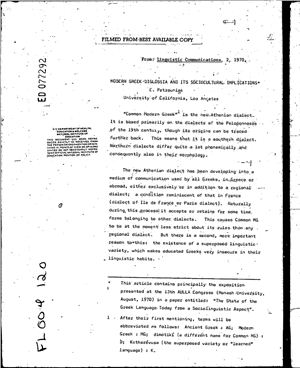Washington, D.C.: 1970. 40 p.
This article explains the linguistic situation in Greece and the condition of diglossia that has arisen there through the use of common Mode Greek, developing from the Athenian dialect into a medium of communication used by all Greeks, and the use of Katharevusa, the "pure" or "purifying" language which is supposedly an imitation of Ancient Greek. The author compares selected features of the two languages in the areas of pronunciation, morphology, semantics, syntax, and spelling. A lengthy discussion conceing the historical reasons leading to the existence of mode Greek diglossia is provided along with remarks conceing the creation of Katharevusa. Using Charles Ferguson's theories conceing diglossia typology, the author applies them to the Greek situation and demonstrates the role of both languages seeking to establish a typology. Concluding remarks conce what effect Greek diglossia is having on Greek education.
This article explains the linguistic situation in Greece and the condition of diglossia that has arisen there through the use of common Mode Greek, developing from the Athenian dialect into a medium of communication used by all Greeks, and the use of Katharevusa, the "pure" or "purifying" language which is supposedly an imitation of Ancient Greek. The author compares selected features of the two languages in the areas of pronunciation, morphology, semantics, syntax, and spelling. A lengthy discussion conceing the historical reasons leading to the existence of mode Greek diglossia is provided along with remarks conceing the creation of Katharevusa. Using Charles Ferguson's theories conceing diglossia typology, the author applies them to the Greek situation and demonstrates the role of both languages seeking to establish a typology. Concluding remarks conce what effect Greek diglossia is having on Greek education.

